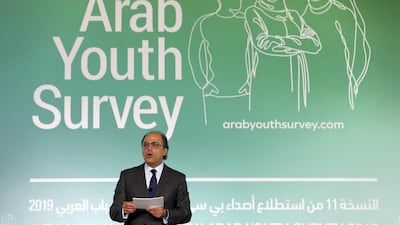Two sets of data released this week provide deep insight into the mindsets of the region’s young people.
As The National reported, Emirates Foundation researchers polled 6,600 Emiratis between the ages of 15 and 30 to produce a comprehensive portrait of the nation. Its results will be used to inform Government policy.
Among the findings, some of those young Emiratis questioned pointed to a difficulty in finding affordable housing and of generally rising prices, citing them as reasons for delaying marriage and starting a family.
Such issues have been taxing policy makers internationally for many years, because economic issues tend to bleed back into longer-term societal changes.
In the UK, France and Germany, the mean age for first marriage is over 30 years old and rising. That also means many couples are having children later and are probably delaying other major financial decisions. One action explains another consequence, and taken together they begin to explain why societies and economies are shifting.
The Emirates Foundation study also found that almost one in five young people felt under pressure. Given that your 20s is the decade when your peer group traditionally expects you to tick off certain life achievements, that figure might be viewed as relatively low.
The reality is, however, that this figure is an indicator that wellbeing and mental health issues are rising across the world and, thankfully, that there is now more acceptance and understanding of the difficulties they pose.
Nevertheless, governments everywhere will have to work harder to combat these issues. Doing so will affect everything from health insurance provision to better HR policies in the workplace and even the regular review of social media laws to tackle such curses as cyber-bullying.
The survey also offered a snapshot of how young entrepreneurs think. At least a third said that securing funding for their new venture was difficult. That reflects an international trend, with small business owners often concerned about whether they have enough money to launch or sustain their idea. It’s impossible for governments to remove risk for entrepreneurs, but they can help by trimming unnecessary red tape and revising the legal framework to make it easier for entrepreneurs to start or continue their journeys.
The broader question is how much governments should react to these data releases and how much should they trust its long-term planning and structures to address these issues?
Last week, Sheikh Mohammed bin Rashid, Vice President and Ruler of Dubai, announced the introduction of a new portfolio, the Ministry of Possibilities. The ministry will assess the effectiveness of the Government and identify areas of improvement.
Its introduction is the latest addition to a collection of new ministries, including youth, happiness, tolerance and AI. This is smart government - mixing strategic vision with short-term intervention - as it adds boutique portfolios to a broader economic and societal vision, grounded in education, healthcare provision and prosperity.
The concerns of young people in this country are mirrored, to some degree, by the Arab Youth Survey, which takes the temperature of the entire Middle East.
The region continues to recognise the UAE as a beacon of hope in a region where conflict is all too common. Dubai, in particular, and the UAE in general has become the place where young Arabs see their futures, replacing Baghdad, Cairo and Damascus as the new magnetic force for people and projects. It's not hard to understand why, given the Government's concentration on education, wellbeing and prosperity.
Otherwise, there are few surprises in the top-line findings: regionally, young people are concerned by a lack of employment opportunities, by enduring conflicts and by the rising cost of living.
The threat of ISIS, a major concern for young people between 2015 and 2017, had subsided as a worry in the most recent survey, reflecting the group's loss of territory. The apparent re-emergence of Abu Bakr Al Baghdadi this week may change that perception in the next survey.
Ending conflict and restoring stability are undoubtedly the key to engineering widespread prosperity in the Middle East, but if the region is to achieve that, it is clear that it must do so without US intervention. The global superpower is generally a more withdrawn player than it used to be, and much less trusted. Only 41 per cent of respondents see America as a strong ally, and that figure is likely to decline still further.
Prosperity and peace will need to be created from within, not imposed from without. Clear vision and strategic thought will be required to do that, as will an understanding of the regional realities and home truths that the Arab Youth Survey articulates.
Nick March is an assistant editor-in-chief at The National


